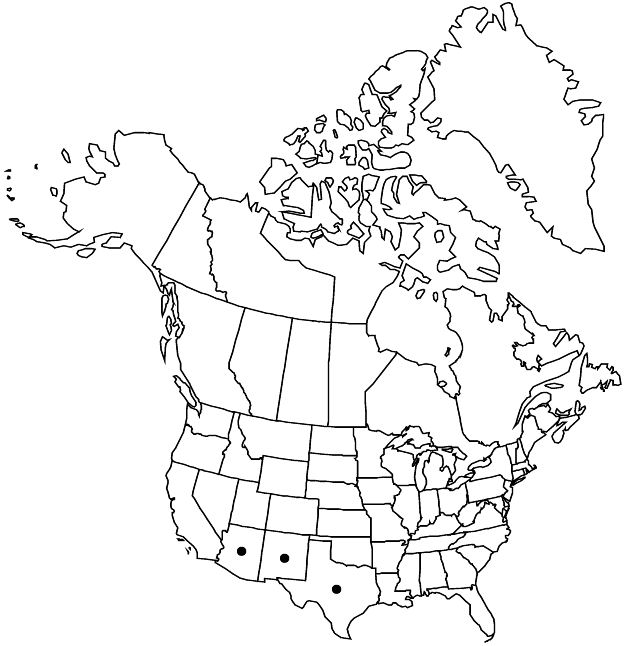Show Lower Taxa
Difference between revisions of "Apodanthera undulata"
Smithsonian Contr. Knowl. 5(6): 60. 1853.
Illustrated
Treatment appears in FNA Volume 6. Treatment on page 29.
FNA>Volume Importer |
RevisionBot (talk | contribs) m (Bot: Adding category Revised Since Print) |
||
| (8 intermediate revisions by 3 users not shown) | |||
| Line 9: | Line 9: | ||
|special_status={{Treatment/ID/Special_status | |special_status={{Treatment/ID/Special_status | ||
|code=F | |code=F | ||
| − | |label= | + | |label=Illustrated |
}} | }} | ||
|basionyms= | |basionyms= | ||
| Line 23: | Line 23: | ||
-->{{Treatment/Body | -->{{Treatment/Body | ||
| − | |distribution= | + | |distribution=Ariz.;N.Mex.;Tex.;Mexico. |
|discussion=<p>Varieties 2 (1 in the flora).</p><!-- | |discussion=<p>Varieties 2 (1 in the flora).</p><!-- | ||
| − | --><p>Apodanthera undulata in the flora area is recognized by its reniform, undulate-margined, and white-backed leaves and yellow petals. Variety australis McVaugh (A. aspera Cogniaux) differs in reduced vestiture and pistillate inflorescence; it occurs in Mexico (Aguascalientes, Guanajuato, Hidalgo, Jalisco, Michoacán, Nayarit, Oaxaca, Querétaro, San Luis Potosí, Zacatecas). According to McVaugh, the two varieties are allopatric.</p> | + | --><p><i>Apodanthera undulata</i> in the flora area is recognized by its reniform, undulate-margined, and white-backed leaves and yellow petals. Variety australis McVaugh (<i>A. aspera</i> Cogniaux) differs in reduced vestiture and pistillate inflorescence; it occurs in Mexico (Aguascalientes, Guanajuato, Hidalgo, Jalisco, Michoacán, Nayarit, Oaxaca, Querétaro, San Luis Potosí, Zacatecas). According to McVaugh, the two varieties are allopatric.</p> |
|tables= | |tables= | ||
|references= | |references= | ||
| Line 34: | Line 34: | ||
-->{{#Taxon: | -->{{#Taxon: | ||
name=Apodanthera undulata | name=Apodanthera undulata | ||
| − | |||
|authority=A. Gray | |authority=A. Gray | ||
|rank=species | |rank=species | ||
| Line 41: | Line 40: | ||
|basionyms= | |basionyms= | ||
|family=Cucurbitaceae | |family=Cucurbitaceae | ||
| − | |distribution= | + | |distribution=Ariz.;N.Mex.;Tex.;Mexico. |
|reference=None | |reference=None | ||
|publication title=Smithsonian Contr. Knowl. | |publication title=Smithsonian Contr. Knowl. | ||
|publication year=1853 | |publication year=1853 | ||
| − | |special status= | + | |special status=Illustrated |
| − | |source xml=https:// | + | |source xml=https://bitbucket.org/aafc-mbb/fna-data-curation/src/2e0870ddd59836b60bcf96646a41e87ea5a5943a/coarse_grained_fna_xml/V6/V6_44.xml |
|genus=Apodanthera | |genus=Apodanthera | ||
|species=Apodanthera undulata | |species=Apodanthera undulata | ||
}}<!-- | }}<!-- | ||
| − | -->[[Category:Treatment]][[Category:Apodanthera]] | + | --> |
| + | |||
| + | [[Category:Treatment]] | ||
| + | [[Category:Apodanthera]] | ||
| + | [[Category:Revised Since Print]] | ||
Latest revision as of 17:11, 6 November 2020
Distribution

Ariz., N.Mex., Tex., Mexico.
Discussion
Varieties 2 (1 in the flora).
Apodanthera undulata in the flora area is recognized by its reniform, undulate-margined, and white-backed leaves and yellow petals. Variety australis McVaugh (A. aspera Cogniaux) differs in reduced vestiture and pistillate inflorescence; it occurs in Mexico (Aguascalientes, Guanajuato, Hidalgo, Jalisco, Michoacán, Nayarit, Oaxaca, Querétaro, San Luis Potosí, Zacatecas). According to McVaugh, the two varieties are allopatric.
Selected References
None.